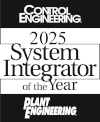E Tech Group Director of Operations Featured on CSIA Podcast
A recent episode of CSIA’s podcast: Talking Industrial Automation, featured E Tech Group’s Director of Operations, Cassy Gardner. A decade of experience in engineering, sales and project management in the Life Sciences field has allowed Cassy to leverage her engineering and MBA degrees to help clients achieve their automation goals. On the podcast, Gardner discusses how she came into the field of automation, citing a professor who inspired her during her senior year and connected her to the automation professionals at Banks Integration, which later became a part of E Tech Group. Let’s look at some of the questions Cassy tackled in her podcast interview and her main talking points: Q: What kinds of trends and challenges are you seeing in industrial automation right now? Engineering labor shortages. Partners, clients, and other automation firms are having a really hard time filling positions with the right type of talent. Company visibility. We’re competing with giants like Apple and Google for the same talent, but are largely referred only by word of mouth within the automation industry. A lack of emphasis on diversity, equity and inclusion in recruitment practices. Q: What is DEI and why is it important? Diversity, Equity and Inclusion Another letter being added on is Belonging It’s about people from different backgrounds having equal opportunity to share their skills and perspective. This in turn improves design and engineering because you’re harnessing diverse points of view and skill sets. DEI measures improve the quality of a talent search. Diversity: having a wide array of perspectives and backgrounds Equity: fairness – being thoughtful in policies, procedures and vocabulary Inclusion & Belonging: going past people showing up – making sure people feel like they are a part of the organization/project/story Q: What do you mean by diversity? Engineering is a male-dominated field, … Continued





